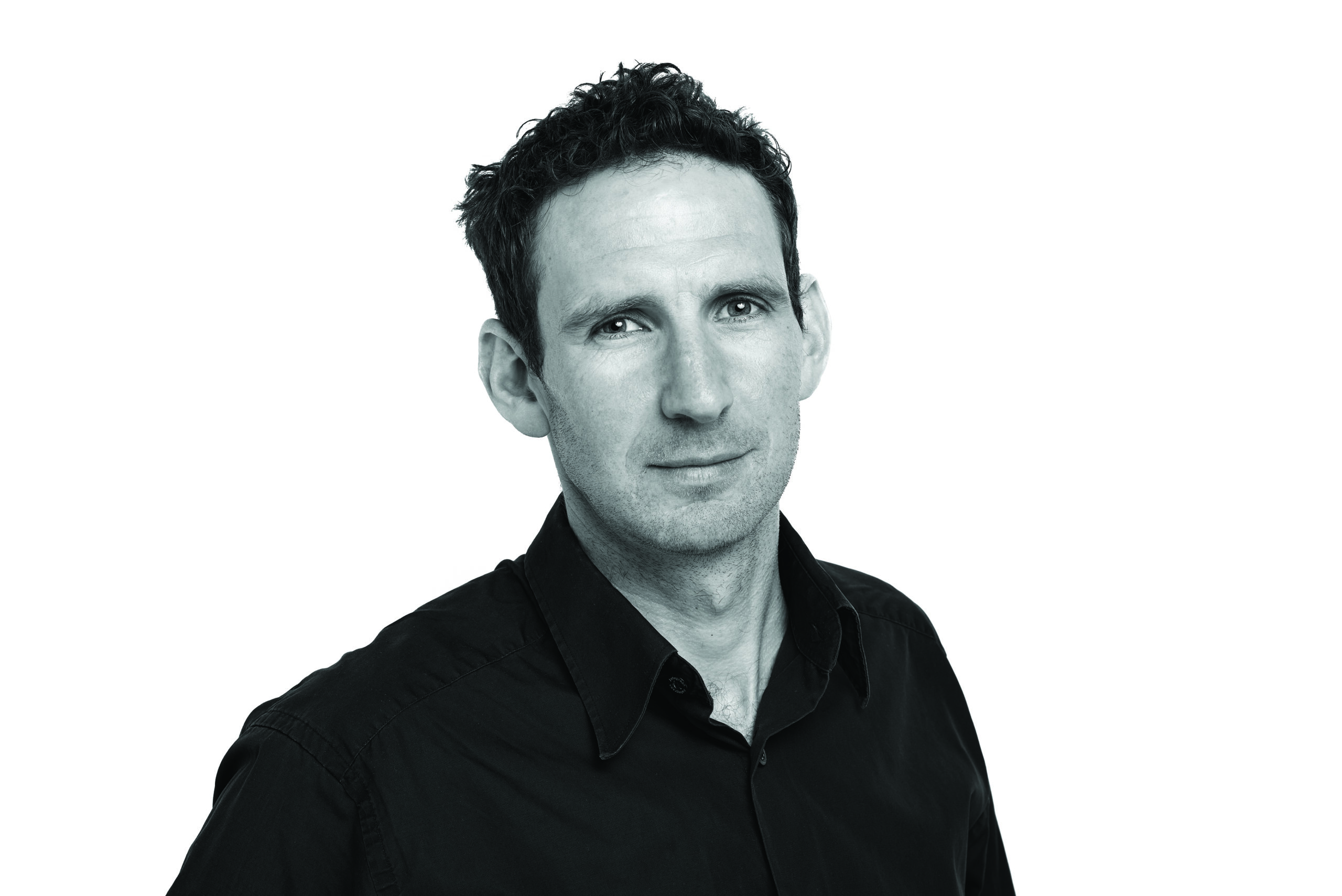Almost 2,000 triathletes stand in their wetsuits by the side of the lake at the National Water Sports Centre, waiting to be called forward for the rolling start.
Most shiver a little, whether through the nip in the air before sunrise or the nervous anticipation of what lies ahead. They ease to one side as a young man in a wheelchair – a ventilator tube helping him breathe, a tartan blanket across the knees to ward off the morning chill – is pushed toward the pontoon.
This wasn’t the triathlon journey Sam Perkins envisaged when he started out in the sport more than a decade ago, but it’s an opportunity – despite having no physical movement remaining – he will seize with everything he has.
The moment is made more poignant as a minute’s silence is impeccably observed for John Ball – the water safety maestro for Outlaw events – who passed away last autumn. It concludes with a round of applause that is extended as Sam is announced over the mic.
Sam’s wife, Emma, is by his side. “Your time is valuable,” she says. “Sam brought that to the fore when he said, ‘I just want to get as much done as I can in the time I’ve got left.’ I replied: ‘You and me both, Sam. You’re no different to me on that one.’ Spend it with the people you want to spend it with. Do the things you want to do.”
Sam wants to be here right now. At the Outlaw Half in Nottingham. Here for one more triathlon…
What is Motor Neuron Disease?
Motor neurone disease (MND), called ALS or Lou Gehrig’s Disease in the USA, is a progressive neuromuscular condition where the motor nerve cells in the brain and spinal cord degenerate.
The average survival time from diagnosis is between two and five years, although some people live much longer with the disease.
Symptoms may start in the hands, feet, arms or legs, or speech or swallowing may be affected.
On receiving the diagnosis, Sam and Emma started the charity, Stand Against MND (or SAM for short) to raise funds for research and local hospice care.
An army assembles
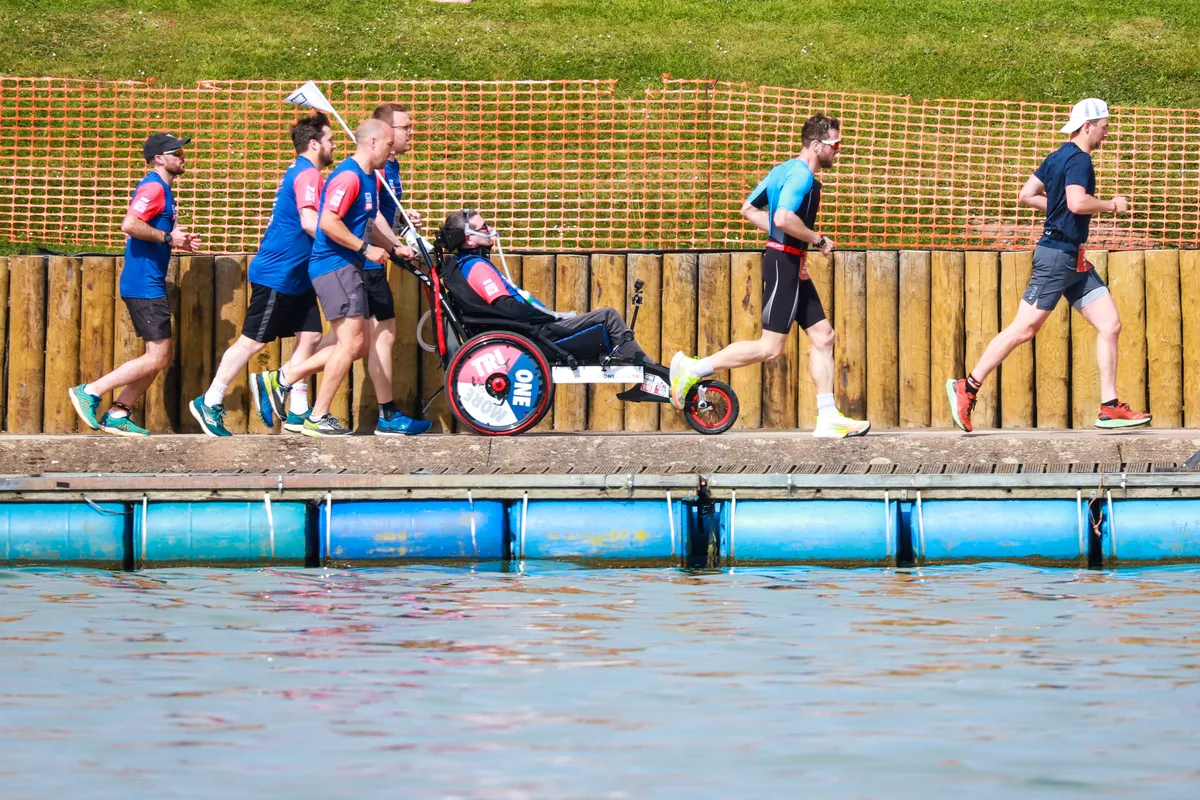
Steph Cobb is securing the tether that will allow her to tow the equivalent weight – made up of sandbags – of a 6ft 2in man in a kayak on the water at Holme Pierrepont. Just swimming 1.2miles wasn’t enough of a challenge.
Asking why she’s put her hand up for this is met with a quizzical stare. “Why would I not? Sam is an amazing triathlete who has always helped me over the years. We both love this ridiculous sport.”
A club-mate of Sam’s at 4Life Tri in the East Midlands, Steph was a junior when Sam first joined in 2010. Today, they are teammates once more, Steph handing over to Sam’s stepfather Nick Rawling for the cycle, who 56 miles later will set Sam on his way in an adapted racing chair.
Or Team Sam to be more precise, because the 40-year-old has recruited an army of willing volunteers to help push him around the half-marathon run course: friends, carers, triathletes, former players from his beloved Nottingham Forest, and for the final lap, his family.
I realised this thing doesn’t need to stop me. The biggest limiter is inside your head
Sam
Sam’s popularity partly stems from his relatability. His introduction to triathlon wasn’t atypical. Drinking and smoking a little too much, it became a topic of conversation with Nick on Christmas Eve 2009.
“I’d always done a lot of exercise, and know how good it makes you feel,” Nick says. “I suggested going down to the tri club – I hadn’t done triathlon either – to see how it felt. “It was quite daunting for him, but to his credit he said: ‘Okay, let’s go!’ and he just got more and more into it, would keep spreadsheets of his performance, the weight fell off, and he got really fit.”
Sam completed seven sprints in that first year, more than 40 events in total and would finish Ironman UK in 2014 and the full Outlaw in 2016.
“When Sam asked if I’d be prepared to do the bike leg, I said a lot of people could do a lot better job than me, but he insisted because I was the one who’d encouraged him in the first place. I agreed, and then had to start training.”
Whatever training Nick has put in is paying off. With Steph an accomplished swimmer, Nick is on his way to a 3:03hr bike split – quite some lick for a 65-year-old on a road bike and the rough chip of the Nottinghamshire highways.
Meanwhile, Outlaw “legend” Dave Manning-Ohren is sweating in T1. Dave has finished all but one of the 28 Outlaw events since the brand’s inception in 2010, and is joining Team Sam for lap four of the run. But first he must finish his own race, and with a grumbling calf he’s going to be pushed. Dashing out of transition and briefly forgetting his bike helmet doesn’t help.
Redefining what's possible
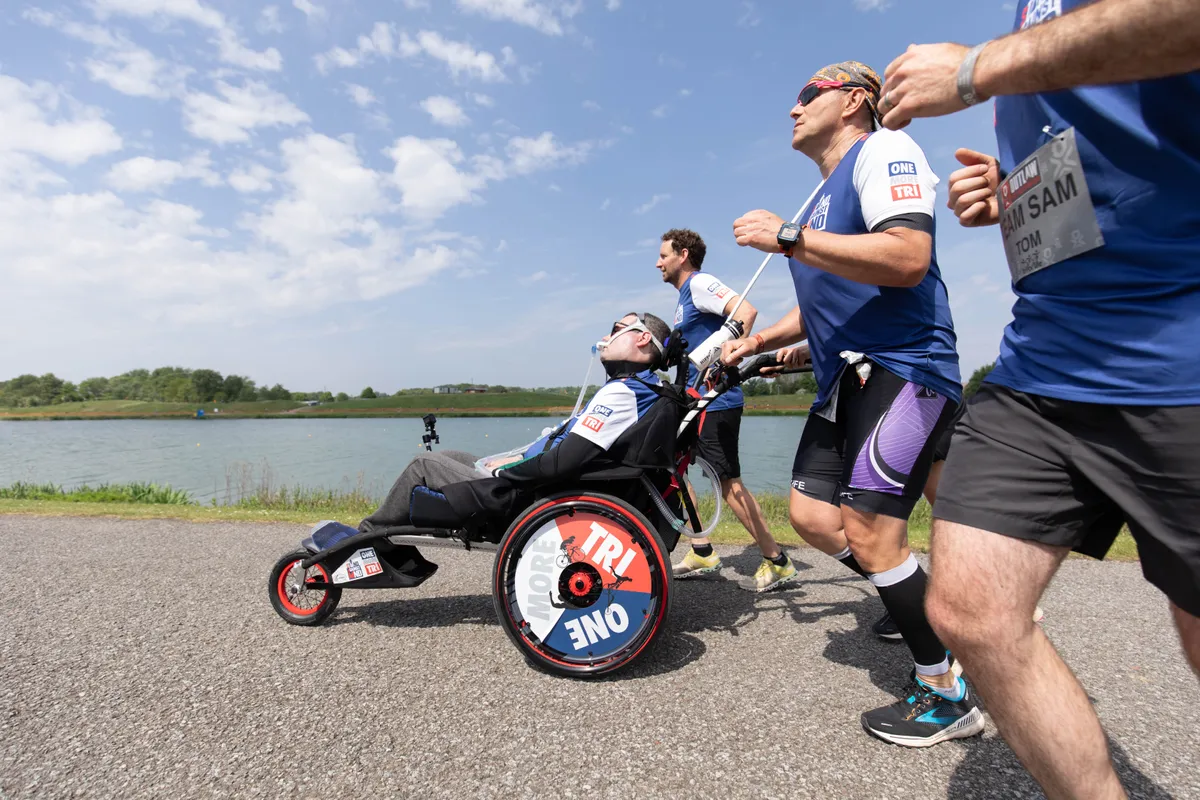
Everything started to change for Sam around 2018. He can’t remember the exact moment, but recalls a shoulder injury that never quite healed and signing up for Outlaw Half Holkham without ever being able to achieve the fitness required to take part.
“The list of weird and wonderful symptoms made me feel like a hypochondriac,” he says. Before long he couldn’t climb the steps at the City Ground to take his seat, and when he struggled for breath every time he lay down, it became clear something was seriously amiss.
Sam was eventually admitted to hospital with pneumonia, his diaphragm no longer working adequately to help clear fluid from the lungs. On 6 March 2019 he was handed the fateful news that he had motor neurone disease.
“It’s not a date I’m likely to forget. I remember sitting by my hospital bed a couple of days after the diagnosis and feeling pretty crappy about life,” Sam says. “We’d already talked about the need to move house and all I was seeing were problems. Emma just said: ‘Whatever you need, we’ll make happen.’ I had a moment where I thought, ‘this thing doesn’t need to stop me.’ Tap back into that triathlon mentality, where you realise the biggest limiter is inside your head.”
Sam and Emma started their own charity, Stand Against MND, to raise funds, predominantly for research into finding a cure for the condition.
“Don’t tell him I said this, but Sam is really popular and has a wide network of friends,” Emma says. “I kept getting messages saying: ‘What can we do?’ I told him that if he asked people to support him in a fundraising event, he’ll get so many engaged. We’ve always said that Sam is the lead singer in our band and I’m the drummer in the background, keeping the rhythm.”
Headlining the planned events was One More Tri, with Sam’s aim to be towed in a dinghy on the water and pushed on the bike and run. Then the pandemic arrived, and it had to be put on hold.
Two years is a long time when you live with MND. “This is version 2.0,” Emma adds. “We spoke to Sam’s medical team and they strongly advised against the swim and bike, but Sam came up with a great idea of having various people from different parts of his life – both pre- and post-diagnosis – supporting him on the run.”
Adapt and overcome
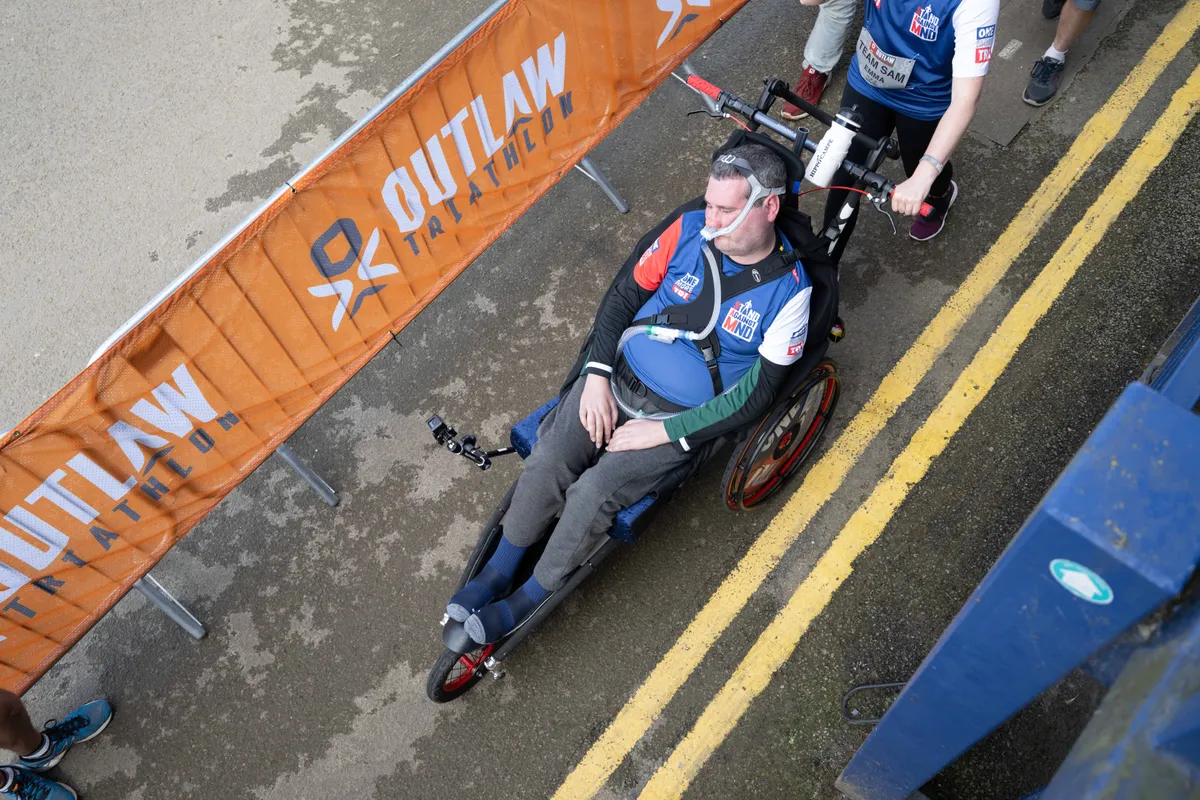
Nick is back from the bike leg, and hands the chip to son, Tom, who runs from T2 to where Sam has been hoisted into a racing wheelchair sourced from specialist supplier, Delichon.
It’s been adapted to house Sam’s ventilator, provide cushioned seating and engineered handlebars to make it easier to push. There’s a GoPro to capture the action, and even One More Tri decals for the disc wheels.
Sam’s close friends, charity trustee Richard Carey, brother-inlaw Glenn Clark and school pal Greg Mitchell take off on the first lap around the lake – almost three miles – and while there was a test run last weekend, precautions are still in place.
Sam’s carer Alex Davies cycles with a replacement ventilator. Tom runs the whole way too, stopping occasionally to make slight adjustments to Sam’s chair.
“Sam used to have this yellow Peugeot bike and I remember cycling to Belvoir Castle before a Forest game, getting lost and just about making it back for kick-off,” Greg says. “After his diagnosis, he inspired me to do my first half. It was an amazing feeling for me – only bettered by today.”
Never without a smile
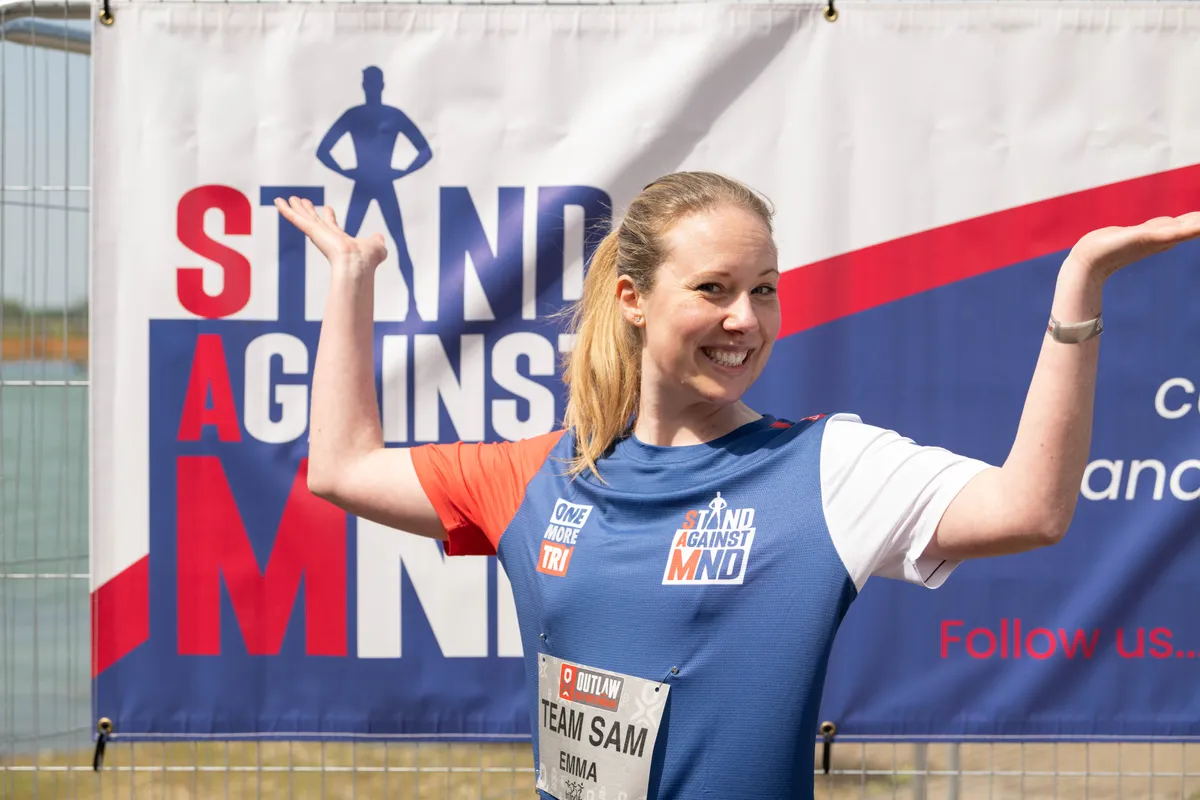
With the sun out and a light breeze, it’s the perfect day for fast times, and the run course is already full of triathletes showing mutual respect and cheering groups of spectators on the side-lines.
Team Sam is moving quicker than expected too, and as the Nottingham Forest contingent, including former professionals Jason Lee and Jack Hobbs take over, there’ll be no drop in pace.
“I got to know Sam through going to Forest games,” says Simon Fotheringham, the commercial manager at the City Ground and vice chair of the local MND Association, who completes the trio.
“My dad was diagnosed in 2006 after three years of symptoms and I got involved with the charity. Most people now know what MND is through high profile people such as rugby league’s Rob Burrow, who are having to live with the illness.
“Nine out of 10 times our funding goes towards research to find a cure. The steps with stem cells and understanding how motor neurons work is chalk and cheese to what it was 16 years ago.
“Everybody deals with it in their own way, but if you need to talk to people just get on the MND website and we can help. I meet a lot of people with MND and most of them are positive – and Sam is the most positive. I never see him without a smile on his face. I’m sure, behind closed doors with Emma and the carers, there are difficult times, but whenever I see him, he’s always happy.”
Meanwhile, Jason and Jack aren’t hanging about, and Simon is feeling the heat. “I forgot how competitive ex-pro footballers can be. When I was joking about being the quickest lap, those two took it seriously.”
The third lap is over to occupational therapist Anna Critchley, Steve Haake, professor of sports engineering at Sheffield Hallam University, and Matt Julier, a PE teacher, triathlete and coach from Colchester who lost his own father to MND and contacted Sam after he heard of the initial idea.
“Sam reached out and said he’d love to have me as part of the team,” Matt says. “Triathlon is a wonderful community. Hopefully, there’ll be people supporting today who will want to give tri a go and realise it’s not just about the event but the journey people are on to get there.”
A hero's welcome
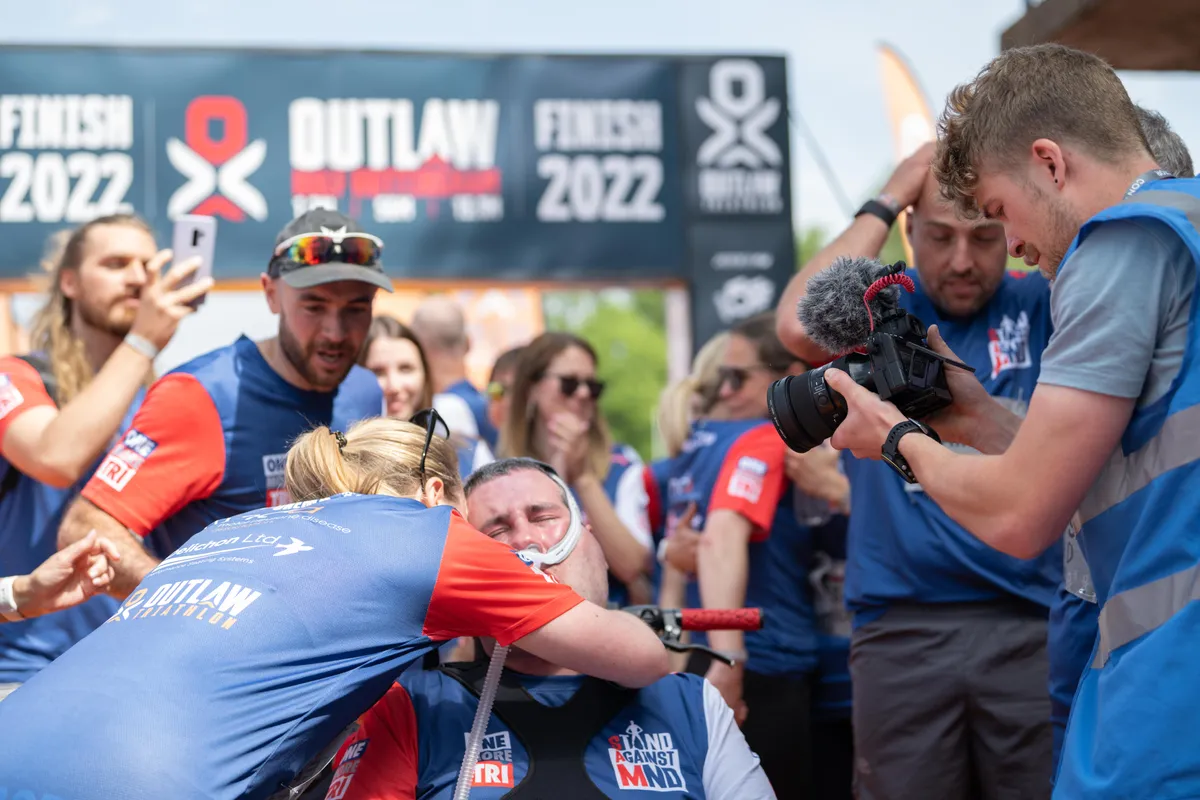
Heading into lap four there’s a problem. Dave is still completing his own race and won’t make the finish in time. But just as Steph prepares to pull on her trainers – “packed in case of emergency” – Dave appears and puts his timing chip to one side. Once done, he’ll return to collect it and complete his final lap.
Spectators are becoming used to seeing the chair and its revolving cast pass by. Sam’s sister Rebecca has used her design skills for the One More Tri logo and T-shirts, which Huub has provided in support of the event.
Sam’s link with Huub stretches back more than a decade when, in his role as a business consultant, he helped founder Dean Jackson source the growth funding to build the business.
The way he’s turned a desperate negative into a positive is beyond my comprehension
Sam's mum, Helen
Rebecca, together with sibling Victoria and Emma, set off on an emotional final lap. Sam’s mum and dad, Helen and Alan, aren’t the only ones who have a little dust in the eye.
“Ultimately it’s immense pride,” Helen says. “I’m really proud of what he’s achieved today and the man Sam is. He has no physical ability, but such a good brain. The way he encourages people to participate is amazing, and he never appears to get stressed. Sam was 16 days overdue, and we often joke that had they not induced me, he’d still be there because he’s so laid back.
“His attitude has helped him cope with this horrible disease. The way that he’s somehow found the inner strength to turn what the rest of the world would see as a desperate negative into some kind of positive is beyond my comprehension.
"I hope his legacy lives on, that people look back on this and think what a fantastic thing that young man did.” “There are many attitudes Sam could have chosen,” Alan adds. “And he picked this one.”
The exceptional way the organisers – and fellow triathletes – help accommodate Team Sam is no better illustrated than at the finish line, where after pausing in a holding pen to the side of the course to wait for an appropriate gap, the whole 20-plus strong ensemble are called down the orange carpet to the sound of Davie Bowie’s Heroes.
It’s a feeling Sam wanted just one more time. “It surpassed all expectations. I knew it would be special, but I don’t think I quite understood what it meant until it happened. It is amazing, absolutely amazing, I’m so pleased we’ve done it. There’s no doubt today wouldn’t have happened without Emma. She’s unrivalled. I’m a very lucky man.”
To support Stand Against MND’s fundraising efforts, visit justgiving.com/onemoretri
Top image: RB Create
